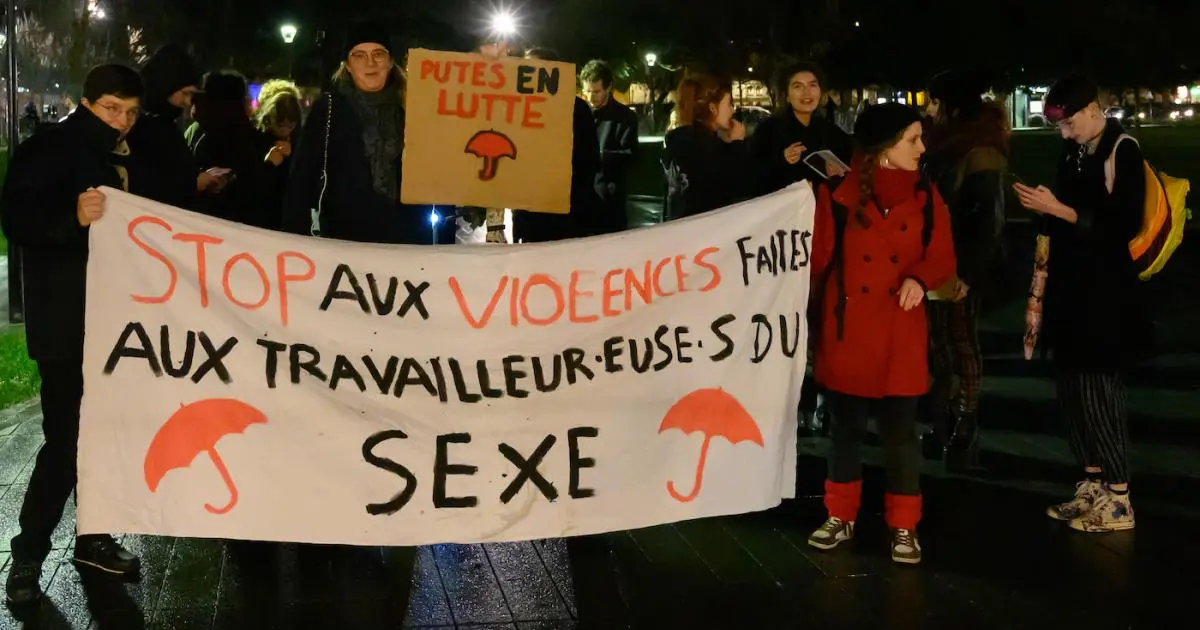Critical Issues Before European Court of Human Rights, Parliament
(Brussels) – The European Court of Human Rights has accepted a case brought by sex workers against criminalization of their work, at a critical moment for sex workers’ rights in Europe, Human Rights Watch said today.
A majority of the court declared admissible on August 31, 2023, a case brought by 261 migrant, queer, and women sex workers against the French government related to its 2016 law criminalizing the purchase of sex. Having ruled that sex workers can be considered victims under Article 34 of the European Convention on Human Rights, the court, part of the Council of Europe, will now examine and rule on the merits of the case. The decision came a day after a motion to criminalize the purchase of sex in all European Union (EU) member states was tabled for a plenary vote at the European Parliament.
“Credible research consistently shows that criminalization increases physical attacks, sexual violence, and police abuse of people who sell sex,” said Erin Kilbride, women’s rights and LGBT rights researcher at Human Rights Watch. “The court’s recognition of sex workers as legitimate claimants is an important step toward protecting their rights, while the European parliament’s proposal calls for laws proven to put women and other marginalized groups in danger.”
The final draft of Parliament’s Report on the regulation of prostitution in the EU: its cross-border implications and impact on gender equality and women’s rights, 2022/2139(INI) was approved by the Committee on Women’s Rights and Gender Equality in June and sent to parliament for a vote on August 30.
The report makes repeated calls to punish clients, including making it a criminal offense in all EU countries to solicit, accept, or obtain a sexual act from a person in exchange for remuneration. The human rights impact of EU-wide criminalization would be disastrous for women, queer people, migrants, and other marginalized groups.
Several UN agencies oppose criminalization, including the Joint United Nations Programme on HIV/AIDS (UNAIDS), the World Health Organization (WHO), the UN Population Fund (UNFPA), and the UN Development Program (UNDP). Civil society organizations including Human Rights Watch, Amnesty International, and the International Planned Parenthood Foundation also oppose criminalization.
In June, the health journal The Lancet called on members of the European Parliament to reject the report, calling it “misguided,” and encouraging the EU instead to follow the lead of sex worker civil society organizations such as the European Sex Workers’ Rights Alliance.
Research across Europe consistently demonstrates that the Nordic Model – which criminalizes the purchase of sex – pushes sex work farther underground, increases violence by police and clients, criminalizes women who work together for safety, and creates more barriers to accessing their rights to health, housing, and justice.
Research from Médecins du Monde found that the 2016 introduction of the Nordic Model in France created a fear of arrest for clients, which forced street sex workers into secluded, dangerous locations. This led to a spike in gruesome murders of sex workers, with 10 sex workers killed in France in a six-month period in 2019.
The coalition of 261 sex workers and their allies, saying that the law subjected them to violence and discrimination, exhausted all domestic legal avenues in France before taking their case to the European Court of Human Rights in December 2019. The court rejected a preliminary objection to admissibility by the French government, and found the case admissible. The Court “rejects around 90 percent of all applications received” according to its own data.
Research commissioned by the Northern Ireland Department of Justice found “no evidence” that when Northern Ireland criminalized the purchase of sex in 2015, this change decreased the demand for sexual services. Following the first two years after Ireland adopted the Nordic Model, in 2017, UglyMugs.ie, a sex worker organization, found a 92 percent spike in reports of violent crime against sex workers. An Irish Department of Justice-funded report found that criminalization “drastically marginalized” an at-risk population and that 20 percent of sex workers interviewed had been sexually exploited by police.
A 2021 report by Front Line Defenders, the international foundation for the protection of human rights defenders, found that anti-prostitution laws also endanger and undermine the work of human rights defenders doing life-saving anti-trafficking work. Such laws make it dangerous or illegal for activists to organize online, conduct health and human rights outreach in brothels, and contact victims, for fear of being arrested and accused of pimping, brothel-keeping, trafficking, or prostitution.
The same report found that anti-prostitution laws make it more likely for establishment owners to deny that sex work happens in their establishment, limiting access for service providers and pushing health and human rights resources further out of reach for both sex workers and human trafficking victims.
Despite this expanse of evidence and the steps toward justice being taken at the Court, the European Parliament’s report, calls on all EU member states to enact exactly the type of legislation shown to increase violence and abuse.
“The European Court of Human Rights decision to admit the sex workers’ case against criminalization comes at critical moment in Europe,” Kilbride said. “Members of the European Parliament will soon have the opportunity to vote against the report, and prominently declare their support for rights-respecting, data-driven policy in the EU.”
Source: HRW News







